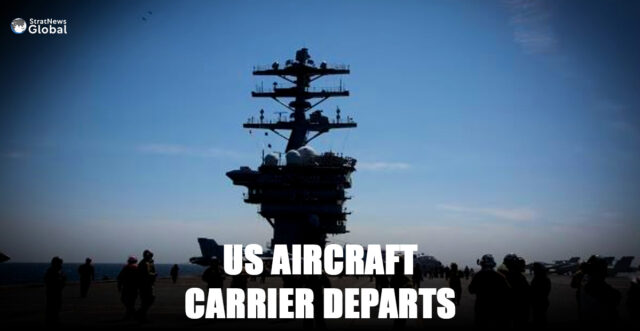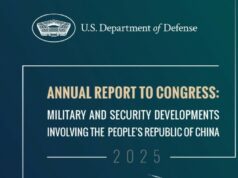On Monday morning, U.S. aircraft carrier USS Nimitz exited the South China Sea heading west, according to ship tracking data from Marine Traffic. The move follows the cancellation of a scheduled port visit in central Vietnam.
The carrier had planned to visit Danang City later this week, but two sources, including one diplomat, said a formal reception slated for June 20 had been called off.
One of the sources said the U.S. Embassy in Hanoi had informed him about the cancellation, due to “an emergent operational requirement”.
The embassy didn’t immediately respond to a Reuters request for comment.
The Nimitz Carrier Strike Group conducted maritime security operations in the South China Sea last week, as “part of the U.S. Navy’s routine presence in the Indo-Pacific,” according to the website of the Commander of the U.S. Pacific Fleet.
Data from Marine Traffic showed the carrier on Monday morning was moving west in the direction of the Middle East, where the battle between Israel and Iran is escalating.
Rising Middle East Crisis
The escalating conflict between Israel and Iran has triggered a rapidly intensifying geopolitical crisis in the Middle East, with repercussions rippling across the region.
What was once a shadow war fought through proxies and cyberattacks has now transformed into open military confrontation, marked by missile strikes, drone attacks, and direct threats.
As Israel targets Iranian military assets and Iran responds with retaliatory strikes, the danger of a broader regional war looms large.
This escalation has alarmed neighbouring countries and global powers alike. Gulf nations are on high alert, fearing spillover effects, while oil markets react nervously to the possibility of disruptions in vital shipping lanes like the Strait of Hormuz.
The United States, traditionally aligned with Israel, is under mounting pressure to either mediate or prepare for deeper involvement.
Meanwhile, Russia and China are watching closely, with vested interests in both Tehran and broader regional stability.
The Iran-Israel crisis also threatens to inflame sectarian divisions, empower extremist groups, and derail efforts at normalisation between Israel and several Arab states.
As the geopolitical chessboard becomes more volatile, diplomatic avenues are narrowing, and the stakes are growing dangerously high.
(With inputs from Reuters)





